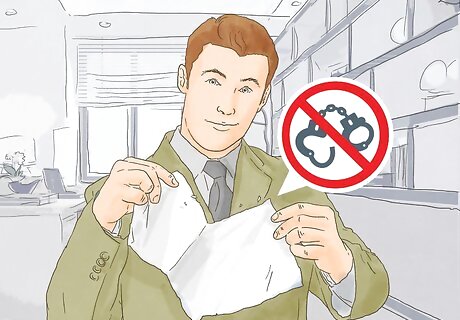
views
Asking the Prosecutor to Drop the Charges

Meet with an attorney. The process for getting criminal charges will differ depending on the county. You should find a criminal defense attorney in the county where the defendant has been charged. Contact the Texas Bar Association for a referral. If it is a domestic violence case, then ask for a referral to an attorney who specializes in domestic violence. If you are the defendant, you should meet with an attorney as well. They can walk you through the steps, which require getting sworn statements from the victim. At your consultation, ask how much the lawyer charges to represent you. Avoid talking with the prosecutor until you meet with a criminal defense attorney. You need to be careful about what you say to the prosecutor from this point forward.

Draft a new sworn statement. The victim will probably need to correct any errors in the original sworn statement they gave to the police. They can work with their lawyer to do this. It's helpful to have a copy of the original sworn statement on hand. Your lawyer can get a copy if you don't have it. You should explain why your initial sworn statement was inaccurate. For example, you might have been so dazed and confused that you couldn’t accurately remember what had happened soon after the incident. Alternately, the police might have written down the information wrong. Don’t lie. It is illegal to make false statements to the police.

Complete an affidavit of non-prosecution. This is an explicit request that the prosecutor drop the charges. There are sample affidavits online. However, you should work closely with your attorney to draft the strongest affidavit possible. You must swear to the truth of the affidavit before an officer or other notary. Think carefully before asking the prosecutor to drop charges. Discuss with your lawyer whether it is a good idea.

Attend counseling. Before the state will drop the charges, you may have to attend domestic violence counseling sessions. The purpose of these classes or counseling sessions is to alert you to the help available for victims of domestic violence. You may also talk about the incident in a safe environment. If a partner is pressuring you to get the charges dropped, you can talk honestly with the counselor about your concerns. Talk to your lawyer about where you can find classes. If they don’t know, then you should seek out a different lawyer who is experienced in domestic violence. The defendant also may have to attend domestic violence classes or counseling before the police will drop the charges.

Lift any protective order, if necessary. If your partner has been charged for domestic violence, you might have received a protective order. You should make sure your partner doesn’t violate the terms of the order. They cannot contact you until you get the order lifted. If you’re contacted, tell your partner to go to a lawyer. Quickly explain you are getting the protective order lifted. Violating a protective order carries steep penalties. For example, your partner could be fined up to $4,000 and/or sentenced to prison for one year. Talk with your lawyer about how to get the protective order lifted. They automatically expire after a certain amount of time, so you could simply wait it out. However, your lawyer can also file paperwork with the court and ask the judge to lift the order.

Wait for the charges to be dropped. The prosecutor might not drop the charges. As explained above, they have complete control about who they prosecute. Your lawyer should be in contact with the prosecutor to find out if the prosecution is going forward. The prosecutor does not need your testimony in order to prosecute the defendant. Instead, they can introduce photographs or 911 call audio, as well as eyewitness testimony and medical records.
Testifying in Court

Avoid talking about the case with others. You can talk to the prosecutor, the police, and your family members. However, you shouldn’t discuss your testimony with anyone else. If someone asks what’s going on, simply say, “I was told not to talk about it.” The defendant's family might be pestering you to drop the charges. If so, tell the prosecutor. They can help you handle the situation.

Show up to court if requested. The prosecutor may go ahead with the prosecution. If you are the victim, then you must show up to court. Refusing to show up can have negative consequences. For example, the state can get a writ of attachment, which orders the sheriff’s deputy to go out and bring the victim to court.

Listen closely to the question. If you don’t understand the question, ask the lawyer to repeat the question or rephrase it. Always repeat the question in your mind so that you understand it. Interpreters are provided for those who are not comfortable speaking in English. You should talk with the prosecutor about the need for an interpreter before the day of trial.

Answer confidently. You shouldn’t preface every answer with “I think” or “I guess.” Instead, give a confident answer. Always speak as clearly as possible, and use words instead of gestures or sounds like “uh huh.” As it turns out, you might not know the answer to every question. Say, “I don’t remember” or “I don’t know” if you really don’t know the answer. If you make a mistake, clarify as soon as possible. Say, “Can I correct something?” and then explain. Always use your own words when testifying. You can’t be coached to say certain things. Always use words that feel comfortable to you.

Tell the truth. You must take an oath before testifying. If you lie, you are committing perjury. In Texas, perjury carries heavy penalties. For example, you could be fined up to $10,000 for lying in court or sentenced to state prison for two to ten years. You may be nervous because you don’t want your partner to be mad at you. Nevertheless, you have an obligation to tell the truth in a court of law. Remember that the state is bringing the prosecution for a reason. The state probably believes only a conviction can get the defendant to confront their dangerous behavior.




















Comments
0 comment